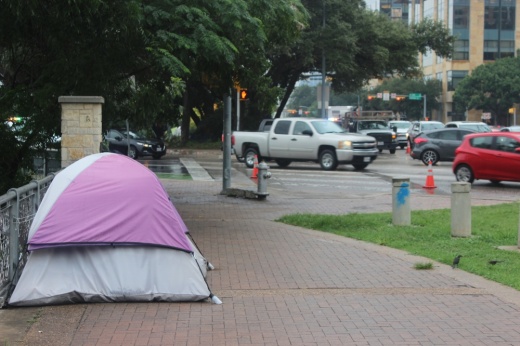Phase 4 of Proposition B enforcement, which began Aug. 8, allows Austin Police Department officers to cite and potentially arrest those who do not relocate after being warned or cited under the camping ordinance. Arrests have always been optional under the phased plan in cases of potential danger, but Chacon said Aug. 10 that police have avoided taking anyone into custody so far since the proposition went into effect in mid-May and hope to continue that trend.
“We don't anticipate to have to significantly scale up the number of arrests that we’re making as part of this. We will look to, for enforcement efforts, always go with the lowest level of enforcement. Generally that is the citation. And before we even go to the citation, we’re trying to get that voluntary compliance," he said. "We found that in the overwhelming majority of cases, that one of those two options is sufficient to go ahead and get people to move."
In the three-plus months since voters approved Proposition B, Chacon said APD officers tasked with enforcement have conducted more than 130 site visits at more than 80 distinct locations to connect with people experiencing homelessness. During those visits, police found nearly 1,300 tents or encampments, and when speaking to individuals, have moved 124 people through assessments as the possible starting points on the path to permanent housing.
“During all phases including in Phase 4, we have continued our education and outreach efforts and continue to operate from a harm reduction standpoint with the objective to get individuals experiencing homelessness on a path to supportive housing," Chacon said. "We continue to work diligently to ensure that all persons encountered during this endeavor are treated with dignity and respect."
He also noted that staff at the Downtown Austin Community Court, where police are aiming to divert most public camping violators, say they are prepared to accept potential new cases through Phase 4.
While APD outreach continues, the looming question of where those on the streets and in unregulated encampments can relocate remains open. One path forward is the city's Housing-Focused Encampment Assistance Link, or HEAL, effort which Homeless Strategy Officer Dianna Grey said has moved around 110 people from three camps into shelter so far this year.
While the first funded phase of the program is expected to wrap up this month, Grey noted District 5 Council Member Ann Kitchen's push to continue the initiative into the coming fiscal year. An amendment to the city's fiscal year 2021-22 budget would, if approved by council, dedicate $6 million in American Rescue Plan Act funds to a second HEAL phase beginning Nov. 1 with a goal of sheltering 200 people on the path to permanent housing.
Another option referenced by Chacon is two local public spaces permitting camping: Emma Long Metropolitan Park and McKinney Falls State Park. Grey also said the city is not yet sure whether there has been an increase in former encampment occupants relocating away from streets and onto other city parkland, although it is a situation staff are monitoring.
"We are certainly seeing movement in encampments, seeing a lot of abandoned encampments and seeing people move around," she said. "We know that folks are obviously going somewhere, and so we’re just going to be keeping our eye on what is a fluid situation in terms of the potential movement of encampments and can continue to provide information as we have a clearer picture of what’s happening.”
Despite the short-term push for Proposition B enforcement and related need for immediate shelter and housing options, Grey noted the city remains focused on its broader goals of housing thousands within the coming years as well.
“What I'd like us to be doing long term is to be really keeping our eye on the prize in terms of the strategies that really solve this problem, which are let’s get people dignified places to live, the support services, employment, et cetera that they want and need, and be proud of all of the efforts that we are collectively making as a city and community," Grey said.





